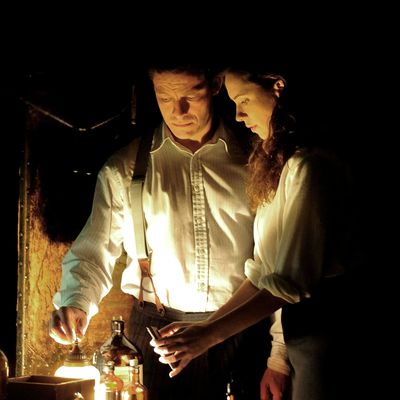
A month or so ago a rather terrible film called Red Lights, featuring Sigourney Weaver and Cillian Murphy as experts in the paranormal who go around debunking supposed hauntings, opened and closed in the blink of an eye. It had no idea of what it wanted to be ÔÇö serious and somber, or campy and ridiculous? ÔÇö and as a result just kind of flailed about helplessly veering between genres, between tones. Almost as if in response to that catastrophe, we now have The Awakening, which features Rebecca Hall as a writer and ÔÇ£ghost hunterÔÇØ in 1921 England who, yes, goes around debunking supposed hauntings. Both films open with s├®ances that are disrupted by our heroes, and both films take some surprising directions after setting up their thriller plotlines. But The Awakening has the good sense to find a mood and stick with it. ItÔÇÖs not afraid to take itself seriously. ItÔÇÖll send shivers up your spine, both as a thriller and as the melodrama it eventually becomes.
Hall plays Florence Cathcart, who has become something of a cause c├®l├¿bre with her screeds against the idea of ghosts and spirits. SheÔÇÖs the object of scorn and hatred; an entire generation of young men has just been fed to the meat-grinder of World War I, and everybody wants to believe that their boys are still around in some way, that these lives havenÔÇÖt been completely wasted. Florence is called to visit a boysÔÇÖ boarding school by melancholy, stuttering history teacher Robert Mallory (The WireÔÇÖs Dominic West), himself a wounded veteran, and superstitious school matron Maud Hill (Imelda Staunton), who seems a bit overprotective of the students. The bucolic school, we are told, was once a private home where a young boy was murdered. And now, it seems, the ghost of this young boy has been appearing and driving the students to their deaths. SheÔÇÖs skeptical that thereÔÇÖs anything actually supernatural going on here, but Florence agrees to take the case, because she canÔÇÖt stomach the idea of these kids ÔÇö most of them not children of privilege but ÔÇ£as good as orphans,ÔÇØ as Mallory tells her ÔÇö being terrorized. Florence herself has written, we are told, that fear is all she remembers of her own childhood. She feels a kinship to these lonely, troubled souls.
The Awakening has all the elements of a satisfying Gothic horror story ÔÇö isolated locale, creepy kids, odd groundskeepers, an emotionally distressed hero, and, of course, a big, creaky house with lots of nooks and crannies. It certainly delivers on those elements, but the film is atmospheric without being ostentatiously so. Director Nick Murphy films the grim setting with a kind of chilly elegance, and his controlled style is key to the filmÔÇÖs effectiveness, helping anchor a story that seems to go in ever-elusive circles: Most mystery-thriller plots reveal their secrets bit by bit, the slow drip-drip of revelation helping to fuel our excitement. The Awakening pretends to reveal itself and then hides again, as weÔÇÖre presented with red herring after red herring. Not unlike The Turn of the Screw, our hero is confused, and the more we follow her, the more confused we become. Hall, who is so good at playing vulnerable women, dispenses with her usual sweetness and presents us with a disturbed character who seems at times like a frayed nerve trying to hide. We know that she herself lost a fianc├®e during the war, but we can sense that thereÔÇÖs more to her character than sheÔÇÖs letting on. For his part, West is effective as a gloomy veteran who doesnÔÇÖt quite know what to believe. (Also, please give him more parts.)
IÔÇÖm probably not shocking anybody by saying thereÔÇÖs a twist close to the end. But interestingly, itÔÇÖs not one of those twists meant to pull the rug out from under and leave us mind-fucked on our way out of the theater. Instead, the third-act revelations send the movie spinning off in an impressive, challenging, and powerful new direction. To say more would ruin the surprise, but The Awakening goes from being an impersonal, if effective, chiller to a far more emotionally open and moving experience. By the end, youÔÇÖre worried not so much about things that go bump in the night; youÔÇÖre more worried about the fates of its broken, poignant characters.


